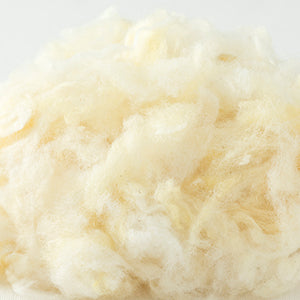

About the unbleached series
unbleached is a product group that takes on the challenge of creating circular products with the theme of "continued use." Unbleached fabrics, fillings, and other materials are limited to those that are unbleached, undyed, and do not use fluorescent brighteners, and have received Oeko-Tex 100 certification for the safety of hazardous chemicals. Eliminating bleaching and dyeing leads to more effective use of water resources and reduced CO2 emissions.
From the QR code sewn onto the product, you can easily access instructions on how to care for it, such as daily care and washing, and you can also refurbish it if it feels worn out over the years.
The Iwata Shiga Factory uses 100% renewable energy, such as solar and small hydropower, and is also participating in the "Renewable Energy 100 Declaration RE Action."
What does it mean to enrich your life?
Sleep nurtures life and supports daily activities.
Good quality sleep enriches your life.
Many people and creatures are involved in the journey of bedding to us, and the journey is also connected to the ocean and forests. When you think about it this way, the meaning of abundance expands.
Let's start living a rich life by sleeping.
Preserving the natural colors of plants and animals. The black dots on the unbleached fabric are broken cotton husks. Not bleaching or dyeing the material reduces the impact on water resources and the atmosphere.
Being simple was both comfort and gentleness. We make bedding that can be dried in the sun or washed in water so that it can be used for a long time. If the years have passed, please feel free to ask us to have it remade.







MAINTENANCE
Unbleached products can be used comfortably for a long time by maintaining them at home. Please see the QR code on the product tag for detailed maintenance instructions, such as how to dry in the sun and wash with water.

REFORM
Even if your bedding has been used for a long time, refurbishing it will restore its comfortable feel. Craftsmen check the condition of each item one by one to improve heat retention, moisture absorption, bulk, and cleanliness. Using limited resources with care will lead to the realization of a recycling-oriented society.


SUSTAINABILITY statement
Since ancient times, Japan has valued the harmony between people and nature. We have used the resources provided by water, air, animals and plants with care as wisdom for living a healthy life.
Now, we want to go back to our roots and reevaluate our manufacturing methods. There are some ideas that have not come to fruition due to the obstacles of reality.
Commitment to sustainability is a never-ending journey. We will connect this new step of unbleached to our next action.
History of Actions
1979 Iwata Feather Research Institute opened
1986 Launch of feather comforters that can be dried in the sun and washed in water
1987 Launched functional bedding made from high-quality natural wool from camels and other animals.
2001 Started a project to make beds from Japanese wood.
2002 Obtained Oeko-Tex 100 safety certification for hazardous substances
2008 Redesignable mattress “LARKOWL” wins Good Design Award
2010: Started thermal recycling and carbon offset of discarded bedding.
2017 Established in-house bedding refurbishment program
2018 Started upcycling “UMO” of other companies’ down comforters
2019: Announcement of “KAGUYA KOKOCHI” bed made from domestic bamboo
2020 Adopt 100% renewable energy electricity (Shiga factory/Kyoto main store)

We use renewable energy from solar power generation and small hydroelectric power generation to power our own factory. We are the first in the bedding industry to participate in the ``Renewable Energy 100 Declaration RE Action.''
For more information, please visit the IWATA corporate website
All products meet these conditions.
Materials are unbleached, undyed, and free of optical brighteners.
Product development centered on sleep science
Hazardous substance safety certification
Obtain Oeko-Tex
Uses materials that have passed our own standard inspections
Manufactured and inspected at domestic factories
![]()






















